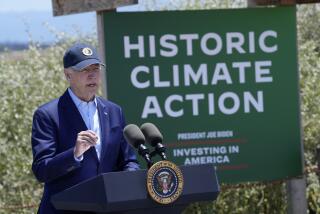Editorial: Biden must set aggressive carbon reduction goals to meet Paris climate targets
A frustrating reality about climate change is that a once-seemingly distant horizon keeps moving up on us. First, we were given dire projections about what could happen by the end of the 21st century if we didn’t act. Then the projections advanced to 2050. More recently, the warnings have sounded about the need for effective and significant action by 2030 — at this point, nine years away.
It’s not that the science has changed, but the pace of climate change itself has picked up, and now the world finds itself increasingly awash in its effects. And increasingly endangered by what’s coming in the future.
President Trump’s four-year reign of deceit, disinformation and all-in policies backing fossil fuels robbed the nation of valuable time to avert the looming climate catastrophe. Though he sought to lead the U.S. to a future of more fossil fuels and more carbon emissions, not many people followed. State and local governments — with California playing a lead role — and the private sector looked at our climate future, gulped, and began taking steps to reduce emissions.
Did the absence of responsible federal leadership rob us of so much time that our goose is cooked? Experts say no, but we must move quickly, and sweepingly. Fortunately, President Biden delivered on his campaign promise to rejoin the 2015 Paris agreement on climate change that Trump walked away from, and in the next few days Biden is expected to announce new national goals for reducing carbon emissions.
He must make them robust. President Obama, whose administration played a key role in the Paris negotiations, set an initial U.S. goal of reducing national greenhouse gas emissions 26% below the 2005 level by 2025, with an added ambition of dropping emissions 28%, and a longer-range goal of 80% by 2050. Those, in retrospect, were too modest.
It will take more than big, empty promises to curtail oil drilling and wean California off fossil fuels.
Environmental groups, business leaders and climate scientists are pressing the Biden administration to move aggressively on both the scope of carbon reductions and the timeline for doing so, backing a 50% reduction in emissions by 2030. Those would put us on the trajectory to reach net-zero carbon emissions by 2050, the goal Biden established shortly after taking office. The president should heed the science here.
But achieving the goal will be neither easy nor cheap — cost estimates are counted in trillions of dollars, though they vary widely — as the nation switches from burning fossil fuel for energy to relying on a mix of renewable sources, most likely led by wind and solar power. But not making the investments will lead to trillions in costs in other areas, including health problems.
Sticking with fossil fuels because it would be expensive to change is not an option unless we’re ready to accept the climate consequences, including sea levels potentially rising by more than 10 feet, depending on how much water is released by melting glaciers and ice sheets in Greenland and Antarctica.
That would be like a massive hurricane tidal surge along the entire U.S. coastline, but one that doesn’t recede, covering 28,800 square miles of land on which some 23 million people currently live. It’s mind-numbing to contemplate the financial costs of that damage alone, never mind the effects of deeper and longer droughts, more intense wildfires, river flooding and other climate-related phenomena.
And that’s just here in the U.S.
Interestingly, the COVID-19 crisis has shown the world a way forward on climate change. When the virus first began spreading, global reactions were expeditious, ambitious in most cases and, despite some notable political failures, effective at countering a fast-moving, quick-changing mortal threat. Governments, nations, industries and people showed that they can work together to confront a mutual danger. And global warming is just such a danger, albeit a slower-developing one that we unleashed on ourselves through more than 150 years of pouring carbon into the atmosphere.
Biden has invited 40 world leaders to a two-day virtual climate summit beginning Thursday that is also an effort to seize the mantle of global leadership on the issue. It is crucial that Biden reestablish confidence among other countries that the Trump interregnum on climate change has ended, though in truth, other countries have reason to be skeptical of us. Obstinate climate denial and its close cousin, misguided frugality, are strong currents in our domestic politics, and a country that elected Trump once is capable of doing so again.
President Biden is slated to announce the withdrawal of U.S. troops from Afghanistan by Sept. 11, ending two decades of military involvement.
But we need to focus on the future. It’s foolish to continue to invest in oil and gas infrastructure, such as the Dakota Access pipeline, when we need to stop burning oil and gas. It is foolish, too, for governments to subsidize the industry through tax breaks, which by one conservative estimate amount to $86 billion a year in the U.S. and Europe alone. And we need to press other nations, led by China and India, to end their support for the coal industry, including financing new plants in other, often developing, countries (China has pledged to make its own economy carbon-neutral by 2060).
Biden’s summit can be seen as a preamble to the United Nations Climate Change Conference scheduled for November in Glasgow, Scotland, where global leaders are expected to deliver revised plans for reducing emissions to meet the Paris agreement targets. So far, what nations have promised has been woefully inadequate, according to a February assessment by the U.N., which Secretary-General António Guterres said “shows governments are nowhere close to the level of ambition needed to limit climate change to 1.5 degrees and meet the goals of the Paris agreement.”
The world knows that averting the worst impacts of climate change will be expensive, with the burden falling mostly on the United States and other industrialized nations that developed massive wealth at the expense of the planet. The world also knows the price of failure looming on that fast-approaching horizon.
More to Read
A cure for the common opinion
Get thought-provoking perspectives with our weekly newsletter.
You may occasionally receive promotional content from the Los Angeles Times.












